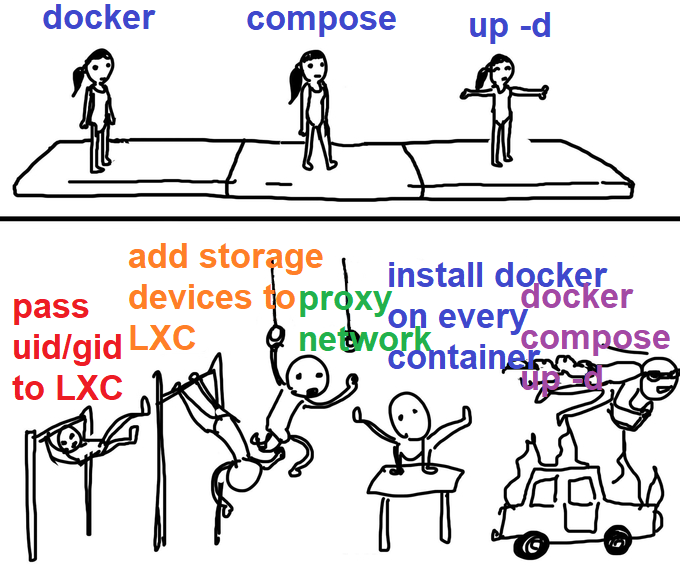Edit: Results tabulated, thanks for all y’alls input!
Results fitting within the listed categories
Just do it live
-
Backup while it is expected to be idle @MangoPenguin@lemmy.blahaj.zone @khorak@lemmy.dbzer0.com @dandroid@sh.itjust.works
-
@Darkassassin07@lemmy.ca suggested adding a real long-ass-backup-script to run monthly to limit overall downtime
Shut down all database containers
-
Shutdown all containers -> backup @PotatoPotato@lemmy.world
-
Leveraging NixOS impermanence, reboot once a day and backup @thejevans@lemmy.ml
Long-ass backup script
- Long-ass backup script leveraging a backup method in series @STROHminator@lemmy.world @lemmyvore@feddit.nl
Mythical database live snapshot command
(it seems pg_dumpall for Postgres and mysqldump for mysql (though some images with mysql don’t have that command for meeeeee))
-
Dump Postgres via
pg_dumpallon a schedule, backup normally on another schedule @RegalPotoo@lemmy.world -
Dump mysql via mysqldump and pipe to restic directly @youRFate@feddit.de
-
Dump Postgres via
pg_dumpall-> backup -> delete dump @2xsaiko@discuss.tchncs.de @SteveDinn@lemmy.ca
Docker image that includes Mythical database live snapshot command (Postgres only)
-
Make your own docker image (https://gitlab.com/trubeck/postgres-backup) and set to run on a schedule, includes restic so it backs itself up @Undaunted@discuss.tchncs.de (thanks for uploading your scripts!!)
-
Add docker image
prodrigestivill/postgres-backup-localand set to run on a schedule, backup those dumps on another schedule @brewery@lemmy.world @Lem453@lemmy.ca (also recommended additionally backing up the running database and trying that first during a restore)
New catagories
Snapshot it, seems to act like a power outage to the database
-
LVM snapshot -> backup that @butitsnotme@lemmy.world
-
ZFS snapshot -> backup that @ikidd@lemmy.world (real world recovery experience shows that databases act like they’re recovering from a power outage and it works)
-
(I assume btrfs snapshot will also work)
One liner self-contained command for crontab
- One-liner crontab that prunes to maintain 7 backups, dump Postgres via
pg_dumpall, zips, then rclone them @DeltaTangoLima@reddrefuge.com
Turns out Borgmatic has database hooks
- Borgmatic with its explicit support for databases via hooks (autorestic has hooks but it looks like you have to make database controls yourself) @PastelKeystone@lemmy.world
I’ve searched this long and hard and I haven’t really seen a good consensus that made sense. The SEO is really slowing me on this one, stuff like “restic backup database” gets me garbage.
I’ve got databases in docker containers in LXC containers, but that shouldn’t matter (I think).
me-me about containers in containers

I’ve seen:
- Just backup the databases like everything else, they’re “transactional” so it’s cool
- Some extra docker image to load in with everything else that shuts down the databases in docker so they can be backed up
- Shut down all database containers while the backup happens
- A long ass backup script that shuts down containers, backs them up, and then moves to the next in the script
- Some mythical mentions of “database should have a command to do a live snapshot, git gud”
None seem turnkey except for the first, but since so many other options exist I have a feeling the first option isn’t something you can rest easy with.
I’d like to minimize backup down times obviously, like what if the backup for whatever reason takes a long time? I’d denial of service myself trying to backup my service.
I’d also like to avoid a “long ass backup script” cause autorestic/borgmatic seem so nice to use. I could, but I’d be sad.
So, what do y’all do to backup docker databases with backup programs like Borg/Restic?


I just started using some docker containers I found on Docker Hub designed for DB backups (e.g. prodrigestivill/postgres-backup-local) to automatically dump from the databases into a set folder, which is included in the restic backup. I know you could come up with scripts but this way, I could easily copy the compose code to other containers with different databases (and different passwords etc).
That is nicely expandable with my docker_compose files, thanks for the find!